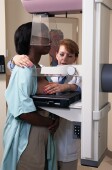
MONDAY, Nov. 23 (HealthDay News) — The fallout from last week’s controversial recommendation that women delay the start of routine mammogram testing for breast cancer continues, with a former head of the U.S. National Institutes of Health advising women to ignore the guidelines.
“I’m saying very powerfully ignore them, because unequivocally this will increase the number of women dying of breast cancer,” said Dr. Bernadine Healy, who was nominated to head the federal agency in 1991 by then-President George H.W. Bush.
“Women in their 40s have a very aggressive kind of breast cancer. They tend to progress fast. And to not screen women in that age group is astounding to me, and it goes against the bulk of individuals who are actually caring for patients,” said Healy, the first woman to lead the National Institutes of Health and currently the health editor at U.S.News & World Report.
She made her comments Sunday during an appearance on the TV news program Fox News Sunday.
The controversial recommendation, released by an independent panel, said that women don’t need to start undergoing mammograms until age 50, and then only need one every other year. Long-standing guidelines have said women should have annual mammograms after age 40.
The independent panel, the U.S. Preventive Services Task Force, said its recommendation was based on the latest and most accurate studies.
Many women immediately wondered if the guidelines would affect their insurance coverage for the breast cancer tests.
But women can rest assured, at least for now, that their health plan will continue to pay for an annual mammogram beginning at age 40. The federal task force’s recommendation against “routine screening” of women under 50 isn’t likely to spur hasty changes in coverage policies, experts say.
“We’re not hearing that coverage is going to change. We’re hearing that coverage will continue pretty much as it has been,” said Susan Pisano, vice president of communications for America’s Health Insurance Plans in Washington, D.C.
Randall Abbott, a senior health care consultant in the Boston office of Watson Wyatt Worldwide, said last week that he had spoken with most major health plans and numerous “self-funded” employers — companies that bear the cost of employee medical claims and administer their own insurance plans — and all are taking the recommendations “under advisement,” he said.
Insurers and employers will likely “delay taking any action until more of a consensus has been reached among the warring parties,” he said.
The new U.S. Preventive Services Task Force guidelines, published in the Annals of Internal Medicine, suggest that women can postpone having a routine mammogram until age 50. It used to recommend those screenings for women in their 40s. And instead of screening every year, it now says screening can take place every two years.
A woman’s decision to start earlier, the task force added, “should be an individual one,” weighing the benefits and harms, such as false-positive results and unnecessary biopsies.
The new advice prompted an outcry from patient advocacy groups and professional societies that urge women to continue getting annual mammograms beginning at age 40.
Most health plans craft their own coverage policies using guidance from professional medical societies, such as the American Cancer Society and American College of Obstetricians and Gynecologists, as well as the government panel that issued the controversial recommendations, Abbott said.
In addition, most states have laws on the books requiring health insurers to pay all or part of the cost of screening mammograms, according to the U.S. National Cancer Institute. Insurers that do business in a state must abide by the law.
However, according to an annual survey by the Henry J. Kaiser Family Foundation and Health Research & Educational Trust, more than half (57 percent) of all employees receiving health-care coverage from an employer are in “self-funded” plans, and these plans are exempt from state laws.
Medicare, the federal health program for older and disabled Americans, covers annual mammograms starting at age 40, and, according to a statement from U.S. Health and Human Services Secretary Kathleen Sebelius, that won’t change. On Thursday, she urged women to “keep doing what you have been doing for years.”
More information
For more on breast cancer, see the U.S. National Cancer Institute.

